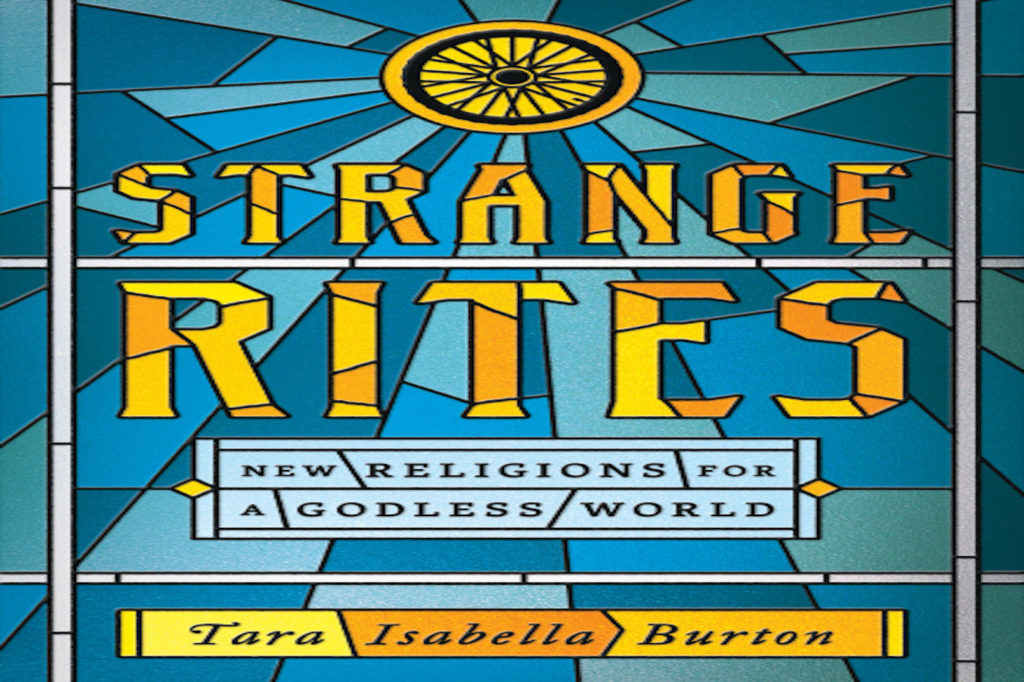For most Americans, the idea of demonic possession makes their skin crawl. But certain subcultures might welcome news of such spiritual provocation. These groups have begun to embrace supernaturalism, at least as a lifestyle. Tara Isabella Burton’s new book Strange Rites artfully documents these “new religions.” In their search for meaning, many—often young—religious seekers find mythical expression for their deep moral convictions and political grievances. They are contentious and growing tribes, ranging from Soul Cycle’s vague spiritualism to Jordan Peterson’s mystical self-help writings. They are radical wiccans and reactionary pagans, disillusioned by mundaneness of late modernity. And they aspire to re-enchant the world by mythologizing their political commitments.
However, today’s new religions typically stop short of professing belief in real, communicable spiritual beings. Their convictions do not transcend the boundaries of ordinary reality; rather, they co-opt a vocabulary of magic to create an aura of mystique around their convictions. Shrugging at the question of whether God, angels, or demons exist, modern pagans and occultists opt for cloudier notions of “energies” and the like. Burton explains that these spiritual impulses are “decoupled from institutions, from creeds, from metaphysical claims about God or the universe” but nonetheless supply “meaning, purpose, community, ritual.”
Burton explains that a prominent feature of today’s “New Age” religion is what British anthropologist Paul Heelas calls “self-spirituality.” Under such a view, according to Burton, the self is the “ultimate source of authority and divinity,” and life’s ultimate goal is “uncontaminated knowledge of the true self.” In one telling episode, Burton’s friend passionately sings “Is That All There Is?” at a party where attendees dress up as fantastic and spiritual characters, semi-mimicking magic. At the center of this spiritual mood is just the self—alone, grasping at hollow rituals, trying to make sense of a fragmented, strange world.
Burton also details the peculiar ways that cultural adversaries of the left and right utilize unambiguously spiritual imagery, language, and even material objects to ornament their political and cultural commitments. The atavism of the alt-right, Burton writes, “is primarily an agnostic faith, with little time for gods beyond nature.” These right-wing neo-pagans aver that “real freedom lies in submission—to existing biological hierarchies, to gender, and to the few authoritative strongmen who, like the Nietzschean Übermensch of more than a century earlier, are worth bending the knee to.” Anonymous internet trolls smirk at the excesses of mainstream culture, which (to them) is effeminate, emaciated, and vacant. They instead turn to primal, sometimes violent, masculinity as being humanity’s central dignity. “Moral meaning” is encapsulated in “primal masculine . . . images of heroic warriors of ages past.”
Start your day with Public Discourse
Sign up and get our daily essays sent straight to your inbox.Meanwhile, astrology and its sister religions, according to Burton, have surged in popularity, especially among young women: “Magical practices—from astrology to tarot to yoga to crystals to sage to cleanings to meditation—are now integral parts of millennial culture.” Some radical fringes even practice modern-styled witchcraft, with varying degrees of earnestness. Biological materialism for the atavist alt-right functions as magical mystique does for millennial progressives: a comprehensive framework and metaphysical grounding for their cultural instincts. This contemporary flavor of occultism is epitomized by the coven of witches in New York who hexed Brett Kavanaugh, in an act of cosmic heroic defiance of white male Christian oppression.
In their myriad ways, these subcultures are simmering for something more, something beyond bleak ordinariness. Citing Harvard Divinity scholars Casper ter Kuile and Angie Thurston, Burton notes that a key hallmark of young Americans’ spirituality is that it’s “unbundled”: a mixture of practices from vastly different religious and devotional traditions, and divorced from institutional and doctrinal contexts. Such unbundling means that a young woman might go to meditative yoga class, attend a Christmas service with family, go to a friend’s Shabbat dinner, and read tarot cards casually, all with no felt contradiction.
The pre-modern mind took spirituality much more literally. Several years ago in The New Atlantis, Alan Jacobs, borrowing from Charles Taylor’s seminal book A Secular Age, described the medieval era’s idea of the “porous self,” which accepts “demonic or otherwise ominous forces” as real entities, producing “a quavering network of terrors.” In its stead, modernity opted for the “buffered self,” a self “better protected, defended” with “impermeable” boundaries between the natural and the supernatural spheres. While many of the new believers Burton examines operate within a decidedly buffered framework, some seem to have one foot in the porous world, especially those who practice witchcraft and dark magic. They wink at the possibility of ontologically real spirits, but toy with spiritual levers nonetheless, simulating devotion and connection to higher powers.
Some important consequences seem to follow from such religious attitudes. Without transcendence, human beings can only blame the world’s ugliness on an uncaring universe, and on one another: in a godless, devil-less world, doesn’t humanity shoulder much of the fault for world’s evil, lacking a path to atonement? Indeed, the free-flowing, institution-less, semi-agnostic religions described in Burton’s account often use spiritual imagery and vocabulary as political weapons (i.e., “witchcraft activists” petitioning the Greek god Hermes to ensure letters to Congress will have a sufficient impact).
This raises the stakes of cultural conflict beyond its proper political scope. Creedal religion, especially Christianity, on the other hand, can have the effect of ameliorating partisan rages: it properly contextualizes them by placing the universe’s ultimate boundaries beyond human conflict. While Christians and other religions sometimes invoke spiritual intervention in worldly affairs, their kingdom is not of this world. They respond to their spiritual duty to improve society, but they know that everything ultimately is protected by providence. This view, if properly held, can leaven the temptation to baptize and perfect politics—to immanentize the eschaton. Moreover, the long pedigree of this country’s peculiar encounters with demonic activity ought to make today’s vague spiritualities, detailed in Strange Rites, take stock of their beliefs, and reconsider whether human beings have a purpose more extraordinary, more powerful than cultivating individual eclectic spiritual identities.
Orthodox forms of Christianity, which are witnessing a resurgence among the young, take seriously the presence of malevolent (and sacred) forces in the world. Such Christians are often devout Catholics or Anglicans who profess the Nicene Creed, abide by traditional moral teachings, rely on ancient forms of divine liturgies (often chanted and in Latin), and decisively reject the prosperity gospel’s vulgarity. “Weird Christianity,” as Burton termed it in the New York Times, responds to the same needs felt by today’s godless religions: need for community, meaning, a sense of purpose. But Christianity does so on a grander and more satisfying scale. In seeing one’s life as part of an epic warfare between beauty and ugliness, angels and demons, good and evil, Christians participate in a cosmic movement far beyond the island of the self, while teaching that the self is nonetheless infinitely precious.
Burton tells a provocative and fascinating story of today’s contentious and vocal religious mood. Another story, perhaps less alluring but also significant, is that there are many more Christians who find quiet joy in their ordinary, everyday faith. Even as lifestyle spirituality preaches the gospel of selfhood, many have found Christianity’s call to radical self-sacrifice the better path to life’s sacred core that we’re all in search of. And while Christianity does not welcome demonic provocations as today’s spiritually parched pagans and witches might, it can certainly call on the aid of angels and saints to defeat them.













